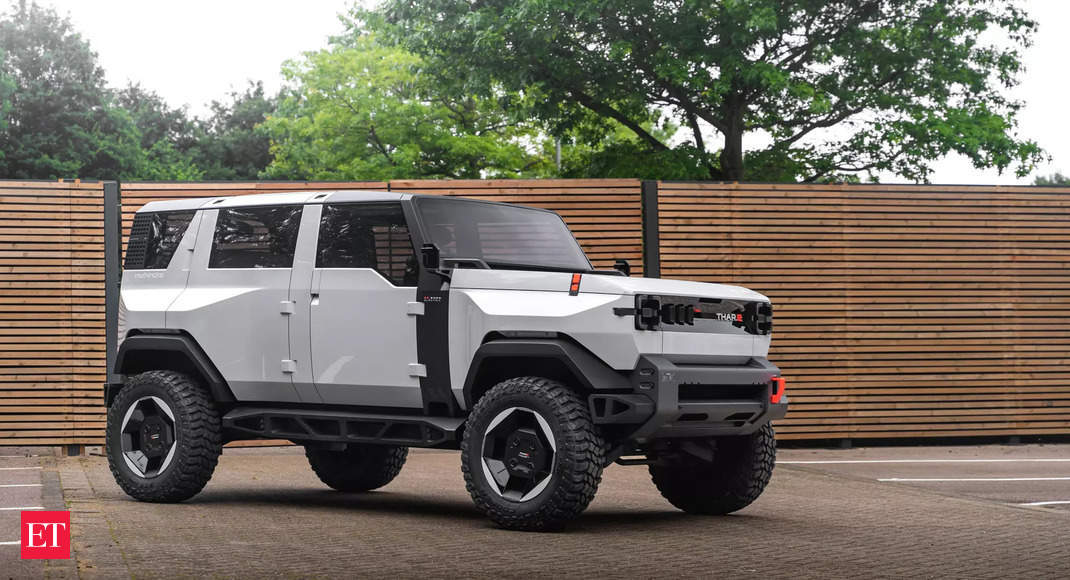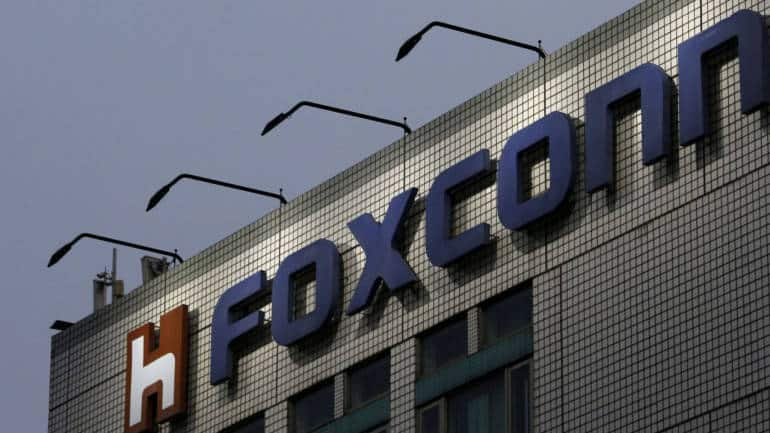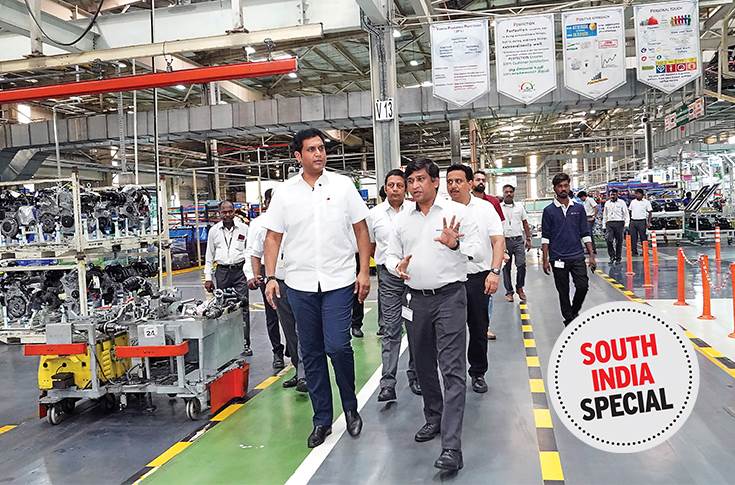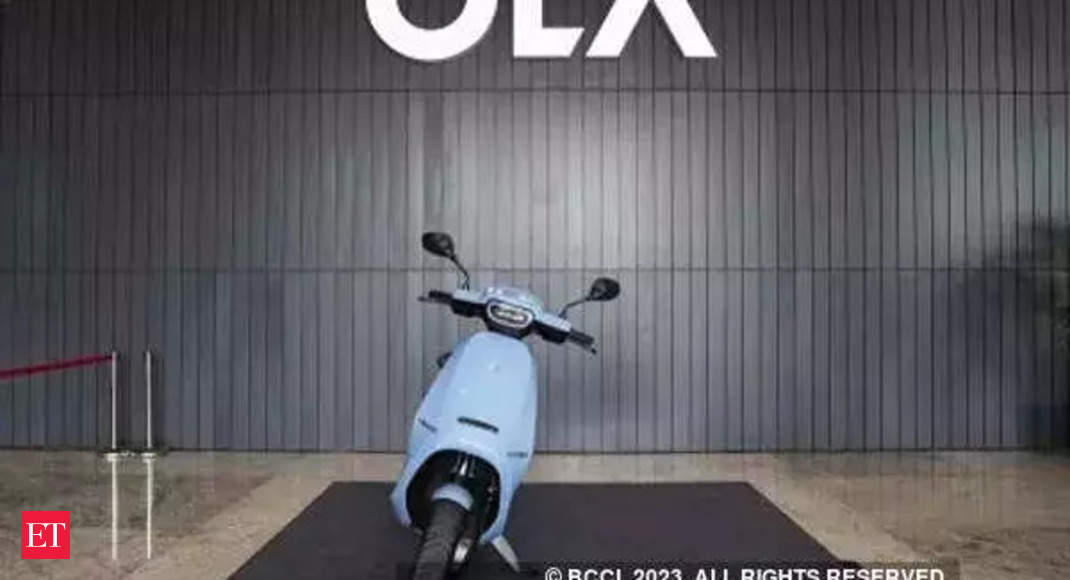Driving South: Auto giants flock to southern India
As the country ushers in the era of electric vehicles (EV), South India is becoming the auto industry’s preferred base for manufacturing and exports. With a vibrant supply chain ecosystem, favourable policies, close proximity to port and other factors, India’s southern states continue to be the front runners in EV manufacturing and consumption. Among them, Tamil Nadu is at the top of the table in manufacturing.
According to a report by research firm CBRE Research June 2023, southern states account for around 33 percent of India's EV manufacturing and around 23 percent of sales.
Tamil Nadu is pitching itself to be “the preferred destination for EV manufacturing in South-East Asia, as per its new EV policy. The state expects about US$ 6 billion investment in the coming years for EV manufacturing and it hopes to generate over 1 lakh jobs.
The state promises reimbursement of state goods and services tax, investment and turnover based subsidy, advanced chemistry cell subsidy, electrification of public and commercial transport and the formation of electric vehicle cities are some of the features of Tamil Nadu Electric Vehicles Policy 2023 among others.
TRB Rajaa, Tamil Nadu’s Minister of Industries told Autocar India that Tamil Nadu is the largest producer of EVs in India with about 46 percent of all the two-wheelers in India that come out of Tamil Nadu. Manufacturing capacities have been built already and going forward, anyone who’s looking to set up an EV factory will first come into Tamil Nadu, and the state will not let go of the opportunity.
In December last year, Telangana too had rolled out a red carpet for EV makers promising attractive fiscal incentives with a hope of inviting similar investments in the state.
India’s EV story
In 2022, EV sales exceeded one million units for the first time, a growth of more than 200 percent on an annual basis. Electric two wheelers (e2w) continued to dominate Indian EV sales with a share of about 62 percent, followed by electric three wheelers (e3w) with 34 percent.
The CBRE report quoted Invest India and Vahan Dashboard data stating that the total number of EVs on roads in India was 2.1 million as of February 2023 and by 2030 it is expected to increase to 40-50 million.
The Indian EV market is expected to grow at a Compounded Annual Growth Rate (CAGR) of about 49 percent between 2021 and 2030, with annual sales crossing 17 million units by 2030 led by Central government initiatives. Additionally, the EV industry is projected to create around 50 million direct and indirect jobs by 2030.
They were formulated to meet targets such as the Paris Agreement, 2015, the second Automotive Mission Plan (AMP), 2016, and the Faster Adoption and Manufacturing of Electric Vehicles II (FAME II) Scheme, 2022. While the Paris Agreement focuses on reducing emission intensities, AMP aims to elevate the Indian automobile industry to global standards. Meanwhile FAME II has an outlay of Rs 10,000 crore and targets increasing EV penetration in automobile sales by 2030.
The Minister of State of Power and Heavy Industries, Krishan Pal Gurjar in a written reply to the Lok Sabha recently said that this phase is mainly focused on supporting electrification of public and shared transportation. The FAME II Scheme aimed to support 7,090 electric buses, 5 lakh e3w, 55,000 electric four wheeler passenger cars and 10 lakh e2w. In addition, creation of charging infrastructure is also supported under the scheme.
The lure of South India
The CBRE report stated that between 2020 and the first half of 2023, the total investment flow into the country's EV sector was US$ 28,820 million. In 2022, the EV sector in India attracted an investment of US$ 17.14 billion, an increase of 287 percent year-on-year compared to US$ 4.43 billion in 2021. Half of the investments in the same period were driven by EV component manufacturers, according to the CBRE Research report. In 2022, nearly 90 percent of the investments went into establishing EV and battery manufacturing facilities.
South India attracted around 33 percent of these investments. Within South India, Tamil Nadu (15 percent) led the states and was followed by Karnataka (11 percent) and Telangana (7 percent). The southern states accounted for around 23 percent of sales ofEVs.
Industry representatives and experts have said that the southern states stand out as they have well-defined EV policies, established manufacturing eco-systems and a strong focus on research and development. This region will make a significant contribution towards achieving the government’s and NITI Aayog’s 2030 EV goals, and positioning India as a global hub in the EV space.
The integration of advanced technologies, such as in-built chargers in EVs, represents one of the major factors propelling the market growth in South India.
Moreover, the rising preference for hybrid electric vehicles (HEVs) as they help to improve fuel economy, lower fuel costs, and reduce emissions, is favouring the growth of the market in the region. Apart from this, the growing investment in installing EV charging stations across South India is creating a positive outlook for the market.
For example, Hosur, which is currently the largest EV cluster, has developed as a major auto cluster with multiple auto component manufacturers having plants.
Among the southern states, Tamil Nadu leads the pack because of its ready-made EV ecosystem that attracts new players and also enables existing manufacturers of fossil-fuel vehicles to transition to EV manufacturing, explained Praneet Gupta, Partner, Bain & Co India in a report from the management consultant firm. Also, Tamil Nadu has a skilled labour pool, with over 800 engineering colleges ensuring a steady stream for the workforce. “The region is equipped with a strong supply-chain ecosystem, making it easier for us to locally source components necessary for manufacturing and assembly. This, in turn, will help us in improving cost and time efficiencies,” Gupta said.
In a race to attract more investments, governments from the southern states are going all out to attract investors in the EV space. Venkatram Mamillapalle, MD and CEO of Renault India said policy stability in Tamil Nadu has been its biggest differentiator. "The bureaucracy in Tamil Nadu is fantastic. Despite the change in the administration, the adherence to the policy is enormously strong. The current minister and his understanding on the subject is quite impressive, but beyond superior understanding there is an intention to develop the ecosystem in tandem with the industry. I think TN not only has the ability, the ecosystem, but there is a drive to leapfrog to new age technology," added Mamillapalle.
Southern Tigers
Telangana aims to attract an investment of Rs 50,000 crore from EV players in the next five years. The state announced a new initiative which is called the Telangana Mobility Valley.Telangana's EV policy is planning to promote greater adoption of EVs, one of the instruments that the state is using is to provide incentives to the early adopters by giving them additional incentives like waiver in road tax, registration fee, and so on and so forth.
In many other states, similar benefits have been given but they are usually to two-, three- and four-wheelers, largely to passenger cars, and in the three-wheeler segment to delivery vehicles. Telangana also gives 100 percent exemption of road tax and registration fee for e-tractors.
Karnataka, which was criticised for losing its home grown Ola's investment to Tamil Nadu, is now going in full swing to attract investments including Tesla. The government of Karnataka has set a target of achieving 100 percent EV adoption for all urban commuting by 2030. South Indian states hope to accelerate EV adoption and reduce emissions by targeting such specific sectors. This also helps to create a market where manufacturers are incentivised to produce more EVs and invest in swapping and charging infrastructure.
Karnataka is another state that offers tangible benefits including road tax exemption and no registration fees for EVs. Beyond these, the EV policy
talks about more long-term focused measures such as capital subsidies for EV manufacturers and production-linked subsidies.
However, an official representing a Bengaluru-based EV start-up said that while these are beneficial in the long run, the more competitive states offer further upfront benefits — for consumers in the form of financial subsidies for the purchase of EVs; and for EV makers in the form of additional upfront capital and low-interest bearing long-term debt with repayment via state goods and services tax (SGST). This is one of the reasons we see many companies moving out of Bengaluru when it comes to setting up manufacturing,” he added.
TN is first amongst equals
Meanwhile for Tamil Nadu, the suitors just keep coming. The biggest investment in the state so far has been Ola's investment in Tamil Nadu to the tune of close to Rs 10,000 crore. In 2020, the company signed an MoU with Tamil Nadu Government to invest Rs 2,400 crore and early this year, it signed another agreement to invest Rs 7,614 crore to set up what it says will be the world's largest electric vehicle hub in Tamil Nadu.
Korean auto major Hyundai announced that it had set aside US$2.5 billion to set up an EV assembly plant in Chennai. Hyundai will open an electric vehicle assembly plant near Chennai with a capacity to produce 75,000 electric cars per annum.
Ather had signed a memorandum of understanding with the Tamil Nadu government for a 4,00,000sq-ft manufacturing facility in Hosur and started operation in January 2021. Ather also recently commissioned its second facility at Hosur that will take the company’s capacity of 400,000 units from the existing 1,20,000 units. Apart from the initial investment that Ather made while setting up the plant in 2021, the company has now committed to invest Rs 650 crore in the next five years to enhance operational efficiency and capacity.
In 2021, TVS Motor signed a memorandum of understanding (MoU) with the Tamil Nadu government for a Rs 1,200 crore investment in future technologies and electric vehicles in the next four years. The investment will be mainly for the design, development and manufacturing of new products and capacity expansion in the EV space.
The electric mobility arm of Greaves Cotton, Greaves Electric Mobility also inaugurated its largest EV production facility in Ranipet, Tamil Nadu. The plant is part of the Rs 700 crore investment roadmap announced by the company to expand its growing share in the Indian electric vehicle market.
Simple Energy, an electric vehicle and clean energy start-up, has inaugurated its first manufacturing plant named Simple Vision 1.0. The plant is built with an initial Rs 100 crore investment and can manufacture up to 1 million units annually.
Tamil Nadu has been an early mover, announcing an EV policy in 2019 with a target investment of about Rs 50,000 crore and another EV Policy in 2023. The policy offers significant incentives including full reimbursement of GST paid on the sale of vehicles, 100 percent exemption on electricity tax and a subsidy on the cost of land.
In July, Tamil Nadu organised a summit called 'Tamil Nadu: Making of the Next Global EV Manufacturing Hub,’ in partnership with the World Economic Forum. At the summit, the state’s officials have said that they are targeting to attract around US$ 6 billion in investments, which will create 1.5 lakh jobs over the next five years.
To support EV manufacturing, Tamil Nadu will further strengthen the ecosystem and address other concerns of the investors, said Tamil Nadu Industries Minister Rajaa.
Chennai, Coimbatore, Tiruchirappalli, Madurai, Salem and Tirunelveli are to be developed as EV hubs as part of Tamil Nadu's accelerated drive to become a global EV manufacturing hub. For charging infrastructure, the state will take a cluster-based approach and shortlist six cities including Chennai, Coimbatore, Salem, Madurai, Tirunelveli, and Trichy that are on a priority list of the Tamil Nadu government. “We are going to focus on these areas and make sure that the infrastructure is ready, so mobility is maximised there. Charging infrastructure is something on which we are concentrating very heavily," he said. Rajaa added that the Tamil Nadu government is willing to help companies put up their infrastructure, and share their costs also, if possible, in certain zones. “We are looking for big players to come into the charging infrastructure space. I think we will be able to pull them in very soon with our incentives,” he added.
The Minister said, the key is high power inputs. Crediting the neighbouring state of Kerala as an example, the Minister said that the state (Kerala) had done a good job on this, where they opened up their sub-stations. "So, when you have your charging infrastructure closer to the sub-station, then a part of the problem is solved. It is not going to solve all our problems, but it is a good place to start,” he said. Further explaining how they were learning from states that were performing well, he said that in Tamil Nadu, wherever there are sub-stations, they are trying to bring in plug-in stations there, so “that will solve the mental block of all those who want to purchase EV vehicles.”
Addressing Concerns
To concerns that there was not enough domestic demand in Tamil Nadu as only 6 percent of EVs are being sold in Tamil Nadu, he said, “This was being addressed on a priority basis. Soon we will also have a good amount of EVs being bought in Tamil Nadu.” On semiconductors, he said, “we are extremely interested in bringing semiconductor industries to the state. We have a separate team working on looking for really big investors who will come in and set up shop very quickly, especially to manufacture fab chip facilities. We are in advanced talks with a few companies, and we should be able to make big announcements in a year or year-and-a-half.”
At the summit organised in July, Gopalakrishnan CS, Chief Manufacturing Officer, Hyundai Motor India said, “We believe that the upcoming action plans will drive quicker adoption of EVs while balancing measures on the supply and demand sides and charging infrastructure in the state.”
Keethi Prakash, MD, Renault Nissan Automotive India, “RNAIPL has been manufacturing cars in Oragadam, Chennai since the start of operations in May 2010. We have been catering to both domestic and export markets and we just crossed the milestone of 2.5 million cars manufactured at the plant for Renault and Nissan. We are committed to excellence in manufacturing and over the next few years, we will be bringing the best in technology products from both brands to our customers here in India. With our base in Chennai, we have been able to take advantage of the strong infrastructure, talent pool and the established cluster of OEMs and suppliers that Tamil Nadu has to offer.”
Simple Energy's Founder and CEO Suhas Rajkumar, has said, "Tamil Nadu's advanced infrastructure, manufacturing-centred policies and locational advantages facilitate its manufacturing ecosystem and easy exports.” Also, he adds, TN is one of India’s fastest-growing automobile hubs that keeps working on various EV policies that can further benefit the EV start-up industry. Clearly, TN’s policies have powered up the EV manufacturing ecosystem. The TN government said that it is committed to securing US$ 6 billion (Rs 50,000 crore) in investments and creating 1.5 lakh jobs within the electric vehicle (EV) sector over the next five years, Dr TRB Rajaa, Minister for Industries, Investment Promotion and Commerce, Tamil Nadu stated at a closed round-table discussion on EVs.
Southern India accounts for around 33 percent of India's EV manufacturing and around 23 percent of sales, according to a CBRE research conducted in June 2023. Click here to know more

www.google.com







